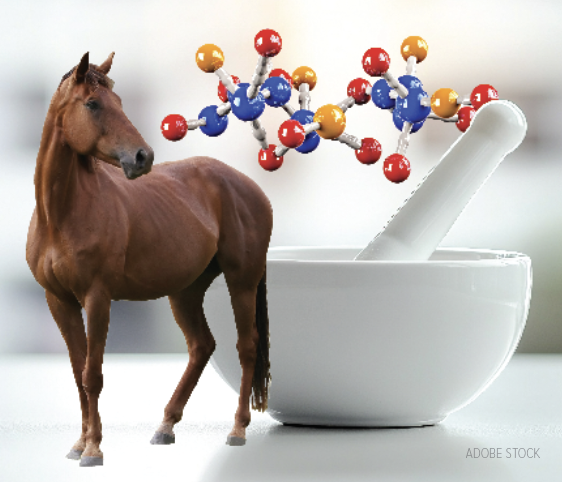Home > Home Sponsored Content > What horse owners need to know about compounded drugs
What horse owners need to know about compounded drugs
- July 14, 2025
- ⎯ EQUUS
Although compounded medications have been part of equine veterinary medicine for decades, they are often misunderstood. Distinct from brand name or generic drugs, these custom-made formulations are appropriate only in specific situations when commercial medications aren’t available.

Compounded medications play an important role in treating many equine diseases and conditions. So it’s important to understand what they are, when they are used and how they are regulated. Here’s what horse owners need to know about compounded drugs.
1. There are two types of compounded medications.
The Food and Drug Administration (FDA) defines compounding as “the process of combining, mixing, or altering ingredients to create a medication tailored to the needs of an individual patient.” The FDA allows two types of medication compounding, both intended to meet an individual’s needs that cannot be addressed by commercially available medications:
• Traditional Compounding: In this type of compounding, state-licensed pharmacies create medications based on a doctor’s or veterinarian’s prescription. This typically involves mixing, combining or altering ingredients to create a drug tailored to a patient’s specific needs. For example, a compounding pharmacy may create a liquid version of a medication for a horse that is unable to swallow pills.
• Outsourcing Facility Compounding involves a third-party entity registered with the FDA under the Drug Quality and Security Act of 2013 to compound medications in large batches. These facilities adhere to certain regulations and can distribute compounded medications to healthcare providers, veterinary hospitals, veterinary practices or pharmacies. In the horse world, a commonly used compounded formulation produced through outsourcing facilities is thyrotropin-releasing hormone (TRH). Veterinarians use TRH to test horses for pituitary pars intermedia dysfunction (PPID).
2. Compounded medications are not generic.
Although compounded and generic drugs are different from brand name medications, it’s important to avoid confusing the two.
Generic drugs are FDA-approved, and their manufacturers must prove bioequivalence with the original drug product. Compounded drugs do not undergo safety or efficacy testing though their makers must comply with regulations governing manufacturing practices. Generic drugs are manufactured in large batches by pharmaceutical companies under FDA oversight. Compounded drugs may be made by smaller, state-licensed pharmacies that are not registered FDA facilities. Unlike compounded medications, generic drugs can be identified by an Abbreviated New Animal Drug Application (ANADA) number on their label.
3. Compounding is appropriate only under specific circumstances.
Compounded drugs have a very well-delineated role in equine health care. In equine veterinary care, their use is appropriate—and legal—only when:
1) the health of the horse is threatened, meaning suffering or death will result if no treatment is administered
2) no FDA-approved animal or human drug is available in the appropriate dosage, form or concentration to treat the horse’s condition
3) the compounding is performed by a licensed veterinarian or pharmacist within their professional practice
4) a valid and ongoing relationship exists between the prescribing veterinarian and the client purchasing the medication.
4. Purchasing compounded medications online requires extreme vigilance.
Due to a lack of regulation and oversight, buying compounded medications must be done with care. Your best resource is your veterinarian, who will know trusted sources that have established reputations for efficacy and safety. Your veterinarian can work with the compounding pharmacy to ensure your horse gets necessary medication in an appropriate dose and form. Buying compounded drugs online without veterinary guidance can expose your horse to potentially poor-quality—and even dangerous—products. Even with your veterinarian’s involvement, you’ll want to seek out information on the pharmacy providing your horse’s compounded medication. The FDA recommends consumers check out their BeSafeRx campaign for tips on buying medicine online. The agency provides warning signs that an online pharmacy may be unsafe or unscrupulous.





